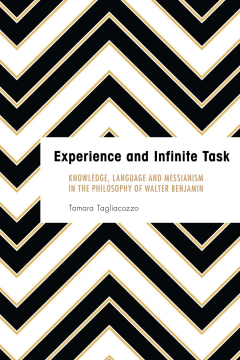
Additional Information
Book Details
Abstract
This book examines the philosophical thought of the young Walter Benjamin and its development in his later work. Starting from his critique of the philosophy of Immanuel Kant and Hermann Cohen, the author traces the relationships among Benjamin’s theories — developed in tandem with his friend Gershom Scholem — of knowledge, language, ethics, politics, the philosophy of history and aesthetics, all linked to the Judaic theme of messianism and language as a realm of redemption. She delineates a horizon in which the concept of experience as structure, philosophical system and “infinite task” (On the Program of the Coming Philosophy, 1917/18) evolves into a concept of the origin as monad (The Origin of German Tragic Drama, 1925), merging finally into the historical concept as monad and dialectical image (On the Concept of History, 1940). Tagliacozzo asserts that the concept of experience as structure and symbolic system, derived from his critical interpretation of Kant and Neo-Kantianism, develops into a conception of thought founded on a theological language of revelation.
Tamara Tagliacozzo is Associate Professor of Moral Philosophy at the Università degli Studi Roma Tre, Italy.
Experience and Infinite Task is an engaging study of some of the most complex aspects of Benjamin’s thought. Taking off from his critique of Kant and neo-Kantianism, Tagliacozzo offers new perspectives on the linguistic and epistemological dynamics that inform his theory of messianic history.
Jan Mieszkowski, Professor of German and Comparative Literature at Reed College
Relying on new readings, this precise reconstruction of Benjamin's early philosophy unearths a unique and almost forgotten constellation of neo-Kantianism, phenomenology, messianic theology and analytic philosophy.
Sami Khatib, Visiting Assistant Professor in the Department of Fine Arts and Art History at the American University of Beirut
Walter Benjamin confided in his friend and intellectual partner Gershom Scholem that were he ever to have his own philosophy, it would one day be rightfully called a philosophy of Judaism. The attempt to hue a new direction in philosophy also coincided with a mutual interest and exchange of ideas in a different tone: in Neo-Kantianism, but also the concept of revolution, the origins of violence, language and religion as a structural or organizing category. In themselves, these are complex themes. Spoken together with the promise of a philosophical program, the undertaking becomes immense. It is all the more for the scholar who uncovers the systemic features of these ideas in their historical wake. After many years of careful research and archeological restoration of Benjamin’s early writings, Tamara Tagliacozzo has brought forth a book of tremendous value. Experience and Infinite Task weaves together these seemingly diverse elements in a comprehensive, rigorous and original manner, revealing an intricate tapestry from the early period of Benjamin’s philosophy and the formative role these ideas would play in his work as a whole. This is a rich and valuable guide for any student of Walter Benjamin in his early period.
Eric Levi Jacobson, Professor of Philosophy and Jewish Studies at Middlebury College and Author of “Metaphysics of the Profane: The Political Theology of Walter Benjamin and Gershom Scholem”
Experience and Infinite Task accomplishes the difficult task of giving readers of Benjamin an experience of the remarkable breadth of his philosophical itinerary. With comprehensive knowledge of the relevant texts and the course of scholarly debates in German, Italian, and English, Professor Tagliacozzo provides a unified, coherent, yet context-sensitive account of Benjamin’s revision of Kantian critique, neo-Kantianism, and phenomenology that will be of lasting value to both students of his work and those interested in early twentieth-century German thought in general.
Peter Fenves, Professor of German, Northwestern University
Table of Contents
| Section Title | Page | Action | Price |
|---|---|---|---|
| Experience and Infinite Task | Cover | ||
| Contents | v | ||
| Introduction | 1 | ||
| 1 Philosophy of Language and Critique of Knowledge | 11 | ||
| 2 Messianism and Political Theology | 99 | ||
| 3 The “Constellation” of Capitalism: Walter Benjamin and Max Weber | 135 | ||
| 4 Messianism, Time, Music: Walter Benjamin’s Work of 1916–1925 | 149 | ||
| Bibliography | 171 | ||
| Index | 185 | ||
| About the Author | 191 | ||
| Permission Acknowledgments | 192 |
